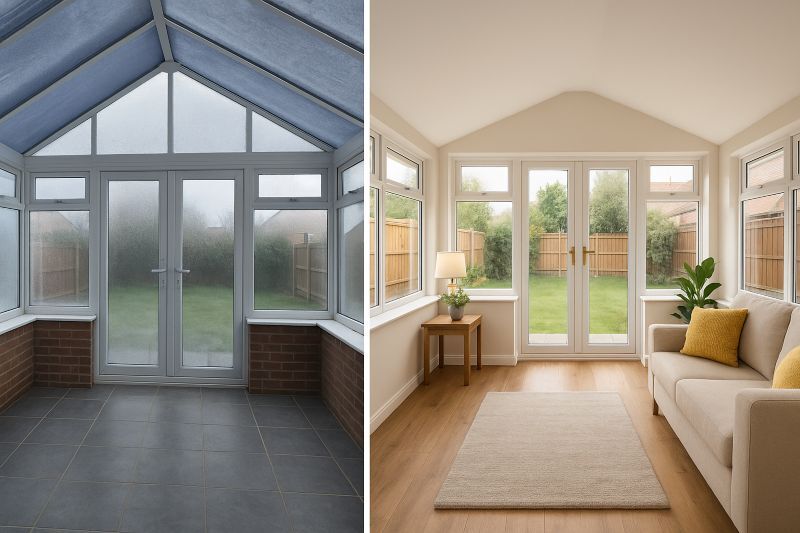Solar Panel & Heat Pump Finance For East Anglia - 0% APR Available
Introducing Our Newly Launched Finance Options: Making Renewables More Accessible One of the biggest barriers to installing renewable technologies...
5 min read
Clare Whitehall : Aug 1, 2025 8:30:00 AM


The shift towards low-carbon heating is gaining momentum across the UK, and East Anglia is no exception.
With the UK government targeting net-zero carbon emissions by 2050, many property owners are exploring greener alternatives to traditional heating systems.
Air source heat pumps (ASHPs) are emerging as a front-runner, offering a sustainable and energy-efficient solution that can significantly reduce household energy bills.
This guide is designed to help East Anglian residents understand the technology, calculate potential heat pump savings, and determine their return on investment.
Air source heat pumps work by capturing heat from the outside air and transferring it inside to warm your home and provide hot water.
They function in a similar way to your refrigerator, but in reverse.
A fan draws in outside air, which passes over a network of refrigerant-filled coils. The refrigerant absorbs the ambient heat and evaporates, becoming a gas.
This gas is then compressed, raising its temperature significantly, and the heat is transferred to your home's heating system, such as radiators, underfloor heating, and your hot water cylinder.
What makes heat pumps particularly appealing is their efficiency.
For every unit of electricity they use, they can produce three to four units of heat. Even in temperatures as low as -15°C, they can operate effectively.
Modern systems also include inverter-driven compressors and smart controls that adjust output based on demand, ensuring year-round comfort and cost efficiency.
Installing an air source heat pump in East Anglia typically costs between £7,000 and £15,000.
This range reflects variables like the size of your property, the existing heating setup, and any required upgrades such as larger radiators or new hot water cylinders.
For many homeowners, this upfront cost can feel daunting. Fortunately, the UK government currently offers financial assistance through the Boiler Upgrade Scheme, which provides a generous grant of £7,500 to help offset the initial investment.
If you live in Suffolk, you could also benefit from additional local support. The Suffolk Warm Homes Loans scheme, run by Suffolk County Council in partnership with Lendology, offers 0% fixed interest loans ranging from £2,000 to £15,000. These can be used to fund ASHP installations, as well as related improvements such as insulation, solar panels, and battery storage.
Annual heat pump savings can be substantial, with average estimates of up to £545 per year - especially if you’re switching from an old gas or oil boiler. These savings can increase even further when you combine them with time-of-use energy tariffs and smart controls.
When it comes to calculating the ROI of your air source heat pump, we need to factor in that a heat pump system can typically last 15 to 20 years.
Let’s break this down with an example:
This significant jump in ROI clearly illustrates why the Boiler Upgrade Scheme is so popular, and why so many East Anglian homeowners are taking advantage of the initiative.
And against the backdrop of rising fossil fuel prices and energy market volatility, there’s never been a stronger case for switching.
Thinking about how much you could save with an air source heat pump? While we’ve shared general figures, the best way to understand the benefits for your specific home is to use a savings calculator that takes your property and energy usage into account.
A great starting point is the interactive calculator from Which?, which helps you estimate both installation costs and potential long-term savings based on your home’s size, energy usage, and heating system. To get the most accurate results, you’ll need a few details to hand—like your current gas usage, the size of your home, and your existing heating setup.
It’s also worth remembering that combining a heat pump with smart controls and a time-of-use energy tariff can significantly boost your savings. Many major energy providers now offer tariffs designed to work hand-in-hand with smart heating technology, helping you make the most of cheaper off-peak electricity.
For even greater clarity, if you'd prefer to speak directly to an expert, the Projects4Renewables team is here to help.
We can provide a tailored breakdown of costs, potential grant support, and realistic savings based on your home and energy habits—taking the guesswork out of going green.
The Boiler Upgrade Scheme (BUS) is a UK government initiative that helps homeowners in England and Wales replace fossil fuel heating with low-carbon alternatives.
Under the scheme, eligible households can receive a £7,500 grant towards the installation of an air source heat pump.
The grant is available to owner-occupiers, small landlords, and private rented sector landlords. To be eligible, your property must:
If you don’t currently have an EPC, or if your certificate highlights insulation upgrades, don’t worry - Projects4Renewables can help. We can arrange an EPC for your property and support you in completing any necessary insulation work, ensuring you meet the grant requirements.
Applications for the scheme are handled by your MCS installer (like Projects4Renewables) who will apply on your behalf.
If approved, the grant is paid directly to the installer and deducted from your installation cost.
The BUS was initially due to close in 2025, but it has now been extended until 2028, making this a strategic time to upgrade your heating system and take advantage of the scheme while funds remain.
As more households apply, delays may increase and future terms may change - so the sooner you act, the better!
Absolutely - especially when replacing inefficient or ageing systems.
The exact savings depend on several variables, including the size and insulation quality of the property, how efficiently the heat pump is installed and operated, and your home heating habits.
From our experience, a well-sized, properly installed system in a reasonably insulated home can deliver consistent indoor temperatures, with savings often exceeding £500 per year when paired with time-of-use electricity tariffs and smart controls.
If you’re a homeowner in East Anglia, Projects4Renewables can provide a bespoke heat pump ROI assessment, helping you forecast your exact heat pump savings before committing to installation.
And if upfront costs are a concern, we also offer 0% interest loans for qualifying customers - making it easier than ever to upgrade to low-carbon heating.
Heat pumps offer an efficient, eco-friendly, and financially viable alternative to gas or oil boilers.
With grants available through the boiler upgrade scheme in the UK, you can achieve an impressive heat pump ROI - making it more compelling than ever to make the switch.
For homeowners in East Anglia, investing in air source heat pump technology is one of the most sensible steps you can take towards long-term energy savings and sustainability.
Speak to the experts at Projects4Renewables to discover how much you could save with your installation and whether you qualify for the boiler upgrade scheme eligibility.

Introducing Our Newly Launched Finance Options: Making Renewables More Accessible One of the biggest barriers to installing renewable technologies...

With energy prices on the rise and sustainability high on the national agenda, more and more UK homeowners are turning to solar panels as a smart,...

Does your conservatory feel like wasted space? In summer, it may be uncomfortably hot, and in winter, too chilly to enjoy.